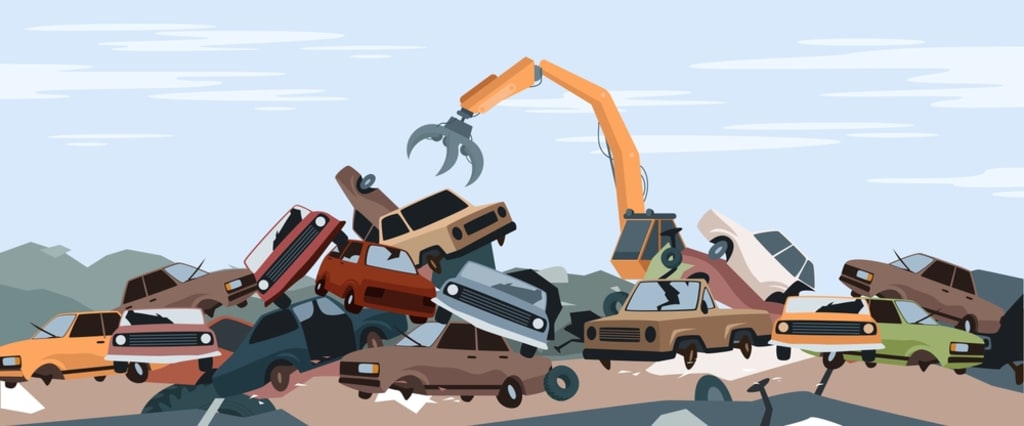Deciding the Chances of Your Unwanted Car: Repair, Sell, or Scrap?
Evaluating the Pros and Cons of Repairing, Selling, or Scrapping Your Unwanted Vehicle to Make an Informed Decision.

When faced with the dilemma of what to do with an unwanted car, car owners are often left curious whether to repair, sell, or scrap their vehicle. Each option carries its own set of advantages and disadvantages, making the decision a complex one. However, in the bustling city of Sydney, Australia, scrap car removal Sydney services provide a convenient solution for those looking to dispose of their vehicles responsibly.
In this article, we will explore the pros and cons of repairing, selling, and scrapping unwanted cars, providing car owners with valuable insights to help them make an informed choice. Whether you're considering car removal in Sydney or elsewhere, understanding the factors involved will enable you to navigate this decision-making process with ease.
Repairing: Pros, Cons, and Considerations
When it comes to unwanted cars, repairing refers to fixing any mechanical or cosmetic issues to restore the vehicle's functionality and aesthetics. This option is particularly appealing if the car holds sentimental value, has low mileage, or possesses unique features that are difficult to replace. Repairing involves addressing specific problems, such as engine repairs, bodywork, electrical issues, or interior renewal.
Pros & Cons of Repairing Unwanted Cars
Pros:
- Extending lifespan: Repairing can prolong the life of the car, allowing you to continue using it for a longer period.
- Maintaining value: A well-maintained and repaired car tends to retain a higher resale value.
- Cost-effective in some cases: If the repair costs are significantly lower than the car's market value or the cost of buying a replacement, repairing can be a more affordable option.
Cons
- High repair costs: Depending on the extent of damage, repair costs can quickly add up, making it economically impractical for some car owners.
- Potential for future issues: Even after repairs, there is a possibility of other
- Time and inconvenience: Repairing a car often requires time-consuming visits to mechanics or repair shops, which can be inconvenient for those with busy schedules.
Considerations - When to Choose Repairing?
Deciding whether to repair an unwanted car depends on several factors. Consider the following points:
Value of the car: Assess the current market value of the vehicle and compare it with the estimated repair costs. If the repair expenses exceed the car's worth, it may be more practical to explore other options.
Extent of damage: Evaluate the severity of the car's damage and consult with professionals to determine the feasibility and cost of repairs. Minor issues may be worth fixing, but extensive damage may make repairing unviable.
Sentimental value: If the car holds sentimental significance, such as being a family heirloom or having personal memories attached to it, repairing might be a worthwhile choice.
Long-term plans: Consider your future needs and plans. If you anticipate needing a reliable vehicle for an extended period, repairing may be a suitable option, especially if the car is relatively new or has unique features.
Availability of parts and expertise: Ensure that the required parts and expertise for repairing your specific car model are readily available. If parts are limited or repairs require specialised skills, it might be more challenging and expensive to proceed with the repairs.
By carefully evaluating these considerations, car owners can make an informed decision on whether repairing their unwanted car is the most appropriate choice.
Selling: Pros, Cons, and Considerations
Selling an unwanted car involves finding a buyer who is willing to purchase the vehicle at a mutually agreeable price. This option allows car owners to transfer ownership and responsibility for the car to someone else, freeing up space and potentially recouping some of the initial investment.
Pros and Cons of Selling:
Pros:
- Financial Gain: Selling a car in decent condition can provide a financial benefit, especially if the vehicle has retained its value.
- Avoiding Repair Expenses: By selling the car, owners can avoid the costs associated with repairs or maintenance, passing those responsibilities onto the buyer.
- Simplicity and Convenience: Depending on the selling method chosen (e.g., private sale, trade-in, or dealership), the process can be relatively straightforward and convenient.
Cons
- Finding a Buyer: The process of finding a suitable buyer can sometimes be time-consuming and challenging, especially if the car has specific requirements or is in poor condition.
- Negotiating a Fair Price: Negotiating the selling price can be a tricky task, as buyers may try to negotiate a lower price based on perceived flaws or market conditions.
- Market Demand: The desirability of the car model, brand, and condition may affect the speed and ease of the selling process.
Considerations - When to Choose Selling:
The Car's Condition: Selling is often a favourable option when the car is in good working condition or only requires minor repairs. Buyers are more likely to be interested in vehicles that are roadworthy and reliable.
Market Value: Assessing the market value of the car is essential. Research the prices of similar vehicles in the local market to set a fair asking price that attracts potential buyers.
Time and Effort: Consider the time and effort required to sell the car. If immediate removal or quick cash is a priority, selling may not be the best option, as it can take time to find the right buyer.
Selling Method: Evaluate the different selling methods available, such as private sale, online platforms, trade-ins, or dealing with dealerships. Choose the method that aligns with your preferences, convenience, and the value you expect to receive.
Scrapping: Pros, Cons, and Considerations
When a car reaches the end of its life or becomes too costly to repair, scrapping becomes a viable option. Scrapping involves dismantling the vehicle and recycling its components, including metal, plastics, and other materials. This process helps in reducing waste and promoting environmental sustainability.
Pros and Cons of Scrapping Unwanted Cars
Pros:
- Environmental Benefits: Scrapping ensures proper disposal of hazardous materials found in vehicles, such as oil, coolant, and batteries. Recycling the metal components also reduces the need for mining and conserves natural resources.
- Potential Financial Compensation: Some scrap yards offer money for scrap cars, based on the value of the materials they can recover from the vehicle.
- Convenience: Scrap car removal services, like Scrap Car removal Sydney, provide a hassle-free solution by arranging the pickup and transportation of the vehicle.
Cons:
- Financial Considerations: While some scrap yards offer compensation, the amount may vary depending on the condition of the car and current market rates for scrap metal. In some cases, the compensation may be minimal or nonexistent.
- Emotional Attachment: If you have sentimental value attached to your car, scrapping it might be emotionally challenging.
Considerations - When to Choose Scrapping?
Extensive Damage: If the car has suffered significant damage due to an accident or natural disaster, the cost of repairs may exceed its value. In such cases, scrapping becomes a more practical choice.
High Repair Costs: If the vehicle requires substantial repairs that are uneconomical or beyond your budget, scrapping can save you from pouring more money into a depreciating asset.
Age and Maintenance History: Older cars with a history of frequent breakdowns and costly repairs may not be worth investing in further. Scrapping can provide a fresh start with a newer, more reliable vehicle.
Lack of Demand: If there is little to no market demand for your specific make and model, selling the car may prove challenging. In such cases, scrapping can be a more convenient option.
Conclusion:
Deciding the fate of your unwanted car requires careful consideration. Whether you choose to repair, sell, or scrap it, weighing the pros and cons is crucial. Repairing may be worth it if costs are reasonable, while selling can provide financial gains but requires market research. Scrapping offers a convenient solution. Consider factors like the car's condition, repair costs, market demand, and personal preferences. Make an informed decision that aligns with your financial situation, environmental concerns, and needs. Choose wisely and take the next steps towards a suitable resolution.





Comments
There are no comments for this story
Be the first to respond and start the conversation.